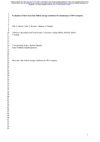 1 citations,
November 2009 in “Hair transplant forum international”
1 citations,
November 2009 in “Hair transplant forum international” Dr. Shoji Okuda's early hair transplantation techniques were rediscovered after being overlooked due to World War II.
 September 2024 in “Egyptian Journal of Dermatology and Venerology”
September 2024 in “Egyptian Journal of Dermatology and Venerology” Combining TRA and latanoprost is most effective for treating localized alopecia areata.
Curcuma aeruginosa Roxb. may help treat hair loss by affecting specific biological pathways.
 May 2024 in “Journal of colloid and interface science”
May 2024 in “Journal of colloid and interface science” The hydrogel helps skin heal by encouraging new blood vessel growth.
 May 2024 in “Frontiers in medicine”
May 2024 in “Frontiers in medicine” A genetic mutation in the LIPH gene causes tightly curled hair that stops growing in some Japanese individuals.

Combining PRP with Tressfix Serum is more effective for hair regrowth in telogen effluvium than using either alone.
 April 2024 in “Materials today bio”
April 2024 in “Materials today bio” The CuCS/Cur wound dressing helps regenerate nerves and heal deep skin burns by rebuilding hair follicles.
 April 2024 in “Dermatologic surgery”
April 2024 in “Dermatologic surgery” Microneedling at a depth of 0.5 mm is the most effective single treatment for hair loss among the tested depths.
April 2024 in “International journal of molecular sciences” Light-based treatment, Photobiomodulation, shows promise for non-invasive skin therapy with few side effects.
 March 2024 in “Advanced science”
March 2024 in “Advanced science” A new hydrogel made from human cells improves wound healing by working with immune cells to promote repair.

The Chromolaena odorata patch significantly speeds up wound healing.
 February 2024 in “International Journal of Biological Macromolecules”
February 2024 in “International Journal of Biological Macromolecules” The study created a new type of microsphere that effectively regrows hair.
 January 2024 in “International Journal of Cosmetic Science”
January 2024 in “International Journal of Cosmetic Science” A new method using 1,4-n-butylene dimaleate effectively repairs and strengthens damaged hair.
 January 2024 in “Tropical journal of pharmaceutical research”
January 2024 in “Tropical journal of pharmaceutical research” Cirsium japonicum var. spinossimum seeds may help reduce inflammation and fight cancer.
 December 2023 in “American journal of medical genetics. Part A”
December 2023 in “American journal of medical genetics. Part A” A new syndrome was linked to two new genetic changes in the MBTPS1 gene in a 14-year-old girl.
 October 2023 in “bioRxiv (Cold Spring Harbor Laboratory)”
October 2023 in “bioRxiv (Cold Spring Harbor Laboratory)” Hair follicles can be kept in RNAlater® at cool or room temperature for a week without harming RNA quality.

The research shows how certain drugs can form stable structures with polymers, which is important for making new pharmaceuticals.
 October 2023 in “Frontiers in medicine”
October 2023 in “Frontiers in medicine” Comprehensive screening for infections is crucial before starting JAK inhibitors in alopecia areata patients.
 October 2023 in “Journal of Cosmetic Dermatology”
October 2023 in “Journal of Cosmetic Dermatology” Using both minoxidil and finasteride together is more effective for hair growth than using either one alone in men with hair loss.
 September 2023 in “Current opinion in microbiology”
September 2023 in “Current opinion in microbiology” Certain fungi protect skin health, but changes can allow harmful fungi to cause serious infections, needing more research for treatment and control.
 September 2023 in “Journal of the American Academy of Dermatology”
September 2023 in “Journal of the American Academy of Dermatology” GoodRx.com helps find the cheapest options for finasteride, a medication not often covered by insurance.
 June 2023 in “Pharmaceuticals”
June 2023 in “Pharmaceuticals” Men and women respond differently to drugs for COVID-19, high cholesterol, and diabetes, which suggests a need for personalized treatments.
 April 2023 in “Journal of Investigative Dermatology”
April 2023 in “Journal of Investigative Dermatology” Tumescent liposuction reduces waist and hip size but doesn't significantly change metabolic markers, though it may slightly improve blood pressure and certain protein levels.
 March 2023 in “JAAD case reports”
March 2023 in “JAAD case reports” A new genetic change in the keratin 10 gene caused a skin condition called ichthyosis hystrix in a father and his daughter.
 January 2023 in “Indian dermatology online journal”
January 2023 in “Indian dermatology online journal” A child with ectodermal dysplasia-syndactyly syndrome has a new mutation in the NECTIN4 gene.
 January 2023 in “International Journal of Zoological Investigations”
January 2023 in “International Journal of Zoological Investigations” Certain genetic variations in IL-16 may increase the risk of alopecia areata.
 January 2023 in “Acta medica Philippina”
January 2023 in “Acta medica Philippina” Papaya flower extract may help with hair growth by blocking a hair loss enzyme and acting as an antioxidant.
January 2023 in “Journal of Veterinary and Animal Sciences” Dogs with skin lesions often have blood abnormalities and damaged hair.
November 2022 in “Frontiers in pediatrics” A girl with skin rashes and low zinc levels improved with zinc supplements and had new gene mutations linked to her condition.
November 2022 in “Journal of Investigative Dermatology” NCSTN gene mutation causes abnormal skin cell differentiation and more inflammation, contributing to Hidradenitis Suppurativa.

























